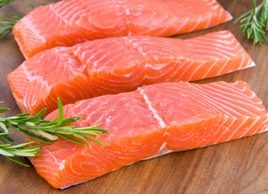Depression and nutrition: Beat the winter blues with vitamins and minerals
How good nutrition can help prevent and treat seasonal affective disorder, depression and more

Source: Web exclusive: December 2008
The good news is that once December 22 hits, and winter officially starts, the days do get longer. The not-so-good news—especially for the 2 to 3 percent of Canadians who suffer from seasonal affective disorder (SAD) and the 15 percent who experience milder “winter blues”—is that spring doesn’t roll around until March 21.
Daily exercise and exposure to sunlight, particularly at midday, can help alleviate seasonal affective disorder, according to the Centre for Addiction and Mental Health (CAMH). But another approach that is often overlooked is supplements, says Dr. Jonathan Prousky, chief naturopathic medical officer at the Canadian College of Naturopathic Medicine in Toronto.
Symptoms of seasonal affective disorder typically include fatigue, weight gain and cravings for sweet and starchy foods. “But depression is the most prominent characteristic,” adds Prousky, who notes that there’s evidence linking sufficient intake of certain vitamins, minerals and fatty acids to lower rates of depression. As a naturopathic doctor (ND), he practices orthomolecular medicine. Nutrition corrects a deficiency, he explains, whereas the orthomolecular approach prevents and treats disease with optimal doses of vitamins, minerals and amino acids.
Recent research demonstrates that consumption of omega-3 fatty acids and vitamin D can play a role in reducing depression. A March 2008 study concluded that omega-3 rich fatty fish—think salmon, mackerel and sardines—may decrease the risk of recurrent depression in non-smokers, for instance. The Canadian Cancer Society currently recommends vitamin D supplementation of 1,000 IU year round, and research by Dr. Raymond Vieth of the University of Toronto indicates that as much as 4,000 IU can improve well-being with no adverse affects in deficient adults.
“You can’t get enough of these from your diet,” says Prousky, who recommends consulting with an ND. “For SAD, a range of 1,000 to 5,000 IU of vitamin D daily would be safe.” He also points to 5-hydroxytryptophan (5-htp), an amino acid that facilitates production of serotonin and may also alleviate depression. (Some trials indicate benefits but more studies are required—and it may interact poorly with antidepressants.) Always consult with both your naturopathic and family doctors before taking any supplements.
In the darker fall and winter months—and year round, really—everyone can benefit from eating lots of brightly coloured foods, including fruits, vegetables and dark leafy greens, and cutting back on junk food, coffee and alcohol, adds Prousky. “I even had a patient who had vegetable-juice smoothie every day, which boosted his overall sense of well-being.” For those with SAD and winter blues, these dietary changes, coupled with light therapy, plenty of sleep and exercise, can be particularly beneficial.
Antidepressants, cognitive behaviour therapy (CBT) or counselling may also be required, particularly for those suffering with extreme anxiety and depression, reduced sociability or suicidal thoughts. “Orthomolecular supplementation can often be used in conjunction with CBT and other therapies,” says Prousky. “Patients should want and get the best of both worlds.” Talk to your doctor and local community organization, such as the Canadian Mental Health Association, to find the best treatment options available near you.
Don’t miss out! Sign up for our free weekly newslettersand get nutritious recipes, healthy weight-loss tips, easy ways to stayin shape and all the health news you need, delivered straight to yourinbox.




